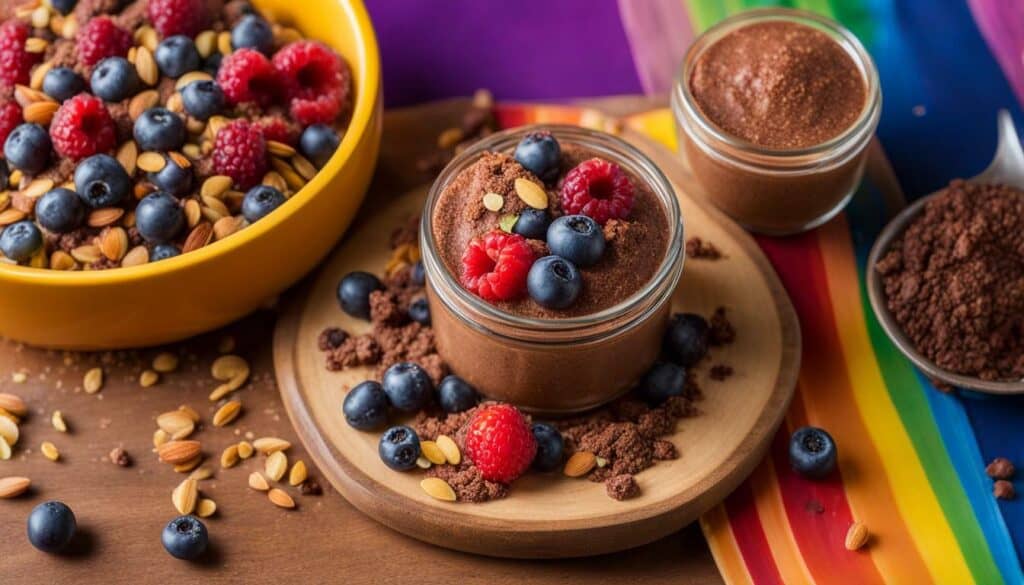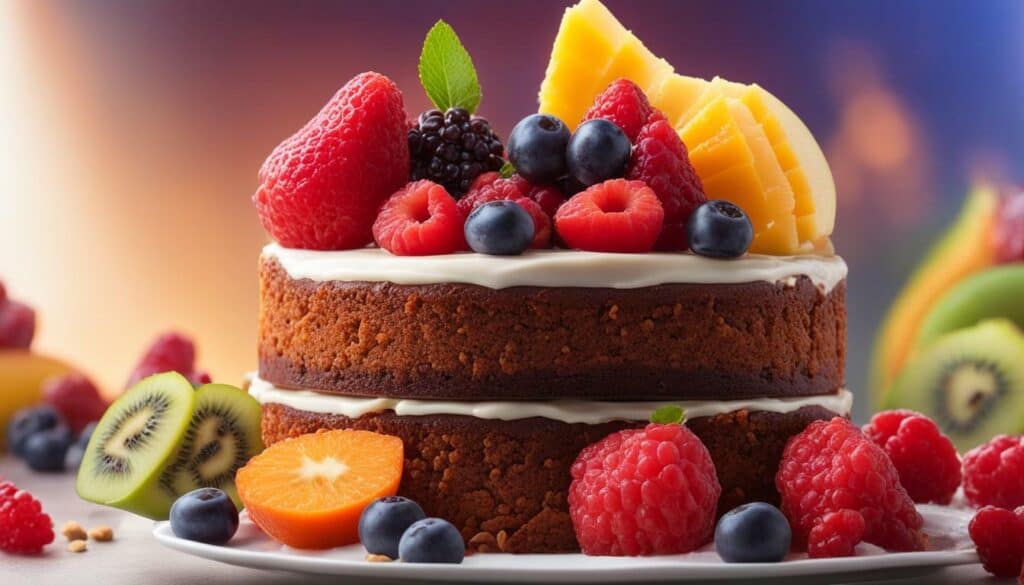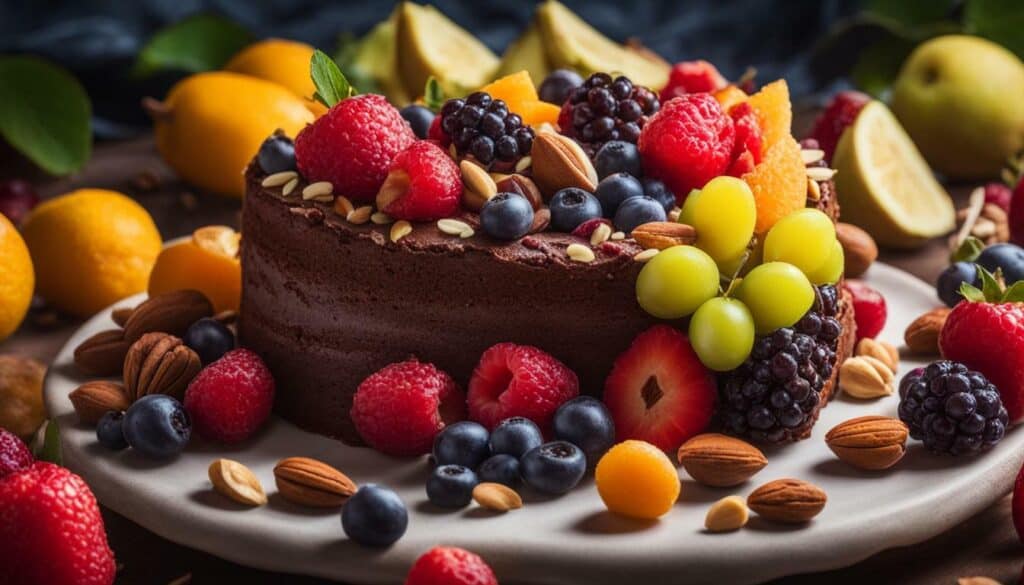When it comes to indulging in a slice of cake, there is more than meets the eye. Beyond the delectable flavors and tempting aromas, cakes hide a surprising array of nutrients that can enhance both taste and well-being.
- Cakes can provide a delightful surprise of hidden nutrients.
- Understanding the nutritional value of cakes is important for a balanced diet.
- Cake nutrition facts and ingredients contribute to the overall nutrient profile.
- Cakes can offer unexpected health benefits, supporting mood, energy levels, and overall vitality.
- Creating healthier cake recipes with nutritious ingredients is possible.
Exploring the Nutritional Breakdown of Cakes
Let’s take a closer look at the nutritional aspects of cakes and discover the hidden benefits they offer in terms of calories, essential vitamins and minerals, protein content, and dietary fiber. Cakes, often considered indulgent treats, can actually provide some surprising nutritional value.
When it comes to calories, it’s important to be mindful of portion sizes. While cakes can vary in caloric content depending on their size and ingredients, it’s generally recommended to enjoy them in moderation as part of a balanced diet. Opting for smaller slice sizes or lighter variations can help keep the calorie count in check.
Cakes can also contain essential vitamins and minerals, depending on the ingredients used. For example, chocolate cakes made with cocoa powder can provide a dose of antioxidants. Additionally, cakes made with fruits such as bananas or berries can contribute to your daily vitamin and mineral intake. These nutrients play vital roles in supporting overall health and well-being.
| Vitamins | Minerals |
|---|---|
| Vitamin A | Iron |
| Vitamin B | Calcium |
| Vitamin C | Magnesium |
| Vitamin E | Zinc |
Furthermore, cakes can contain protein and dietary fiber. Protein is essential for repairing and building tissues in the body, while dietary fiber helps promote healthy digestion. Adding ingredients like nuts, seeds, or yogurt to cakes can boost their protein content. Incorporating fiber-rich ingredients such as whole wheat flour or oats can increase the dietary fiber content, making cakes a more wholesome choice.
So, while it’s important to enjoy cakes in moderation and be mindful of their calorie content, it’s worth noting that they can contribute to your overall nutrient intake. Including a variety of ingredients and opting for healthier alternatives can enhance the nutritional value of cakes, making them a delightful addition to a well-rounded diet.

The choice of ingredients in cakes plays a crucial role in shaping their overall nutritional profile, and by opting for healthier alternatives, we can transform these sweet delights into guilt-free treats. Traditional cake recipes often rely on ingredients high in refined sugars, unhealthy fats, and artificial additives. However, with a little creativity and ingredient substitution, we can make cakes that not only satisfy our taste buds but also provide valuable nutrients for our bodies.
When it comes to creating healthier cake recipes, there are several options to consider. One approach is to swap out refined white flour with whole grain alternatives like oat flour or almond flour. These alternatives are higher in fiber, which promotes better digestion and helps regulate blood sugar levels. Additionally, they offer a range of vitamins and minerals, such as vitamin E, magnesium, and calcium.
Another ingredient to reconsider is the sweetener. Instead of using refined sugars, we can opt for natural sweeteners like honey, maple syrup, or mashed bananas. These alternatives add a touch of sweetness while providing nutrients and antioxidants. Additionally, using unsweetened applesauce or Greek yogurt can help reduce the amount of fat needed in the recipe while adding moisture and protein.
The types of fats used in cakes also play a significant role in their nutritional profile. Instead of using butter or shortening, we can incorporate healthy fats like avocado oil or coconut oil. These fats contain beneficial fatty acids that can support heart health and provide a velvety texture to the cake.

By being mindful of the ingredients we use in our cake recipes, we can elevate their nutritional value without compromising on taste. Experimenting with different alternatives and incorporating nutrient-dense options can lead to creating cakes that not only satisfy our sweet cravings but also nourish our bodies. So, let’s get creative in the kitchen and enjoy the pleasure of guilt-free indulgence!
Uncovering the Surprising Health Benefits
Beyond their delightful taste, cakes contain a surprising array of health benefits that can boost your mood, fuel your energy, and contribute to your overall well-being. While it’s easy to associate cakes with indulgence and treat them as occasional splurges, taking a closer look at their nutrient profile reveals that they can offer more than just a momentary delight.
Cakes are often rich in essential vitamins, minerals, and fiber, making them a surprisingly nutritious choice. For example, cakes can provide a significant amount of key vitamins such as vitamin A, vitamin B, vitamin C, and vitamin E. These vitamins play vital roles in supporting various bodily functions, including immune health, energy production, and cell regeneration.
In addition to vitamins, cakes can also be a source of essential minerals. Minerals like iron, calcium, magnesium, and zinc are crucial for maintaining a balanced diet and supporting overall health and functionality. Cakes can contribute to meeting your nutritional needs by providing a small yet valuable amount of these minerals.

Furthermore, cakes can offer a source of sustained energy through their protein content. While they may not be the primary source of protein in your diet, they can still contribute to your daily protein intake. Protein is essential for muscle repair, growth, and maintenance, making it an important nutrient to include in your diet.
| Benefits | Vitamins | Minerals | Protein Content |
|---|---|---|---|
| Boosts mood | Vitamin B, Vitamin E | Iron, Magnesium | Contributes to daily intake |
| Fuels energy | Vitamin C | Calcium, Zinc | Supports muscle repair |
| Contributes to overall well-being | Vitamin A | Maintenance and growth |
While enjoying cakes, it’s important to do so in moderation and to be mindful of the overall calorie content. However, by choosing homemade cakes with nutritious ingredients and alternative baking methods, you can create healthier options that still satisfy your sweet tooth and provide valuable nutrients. So, the next time you indulge in a cake, savor each bite knowing that you’re also nourishing your body in surprising ways.
Nourishing Vitamins in Every Bite
Say goodbye to the myth that cakes are devoid of nutrition – they are actually packed with nourishing vitamins that can provide a delightful boost to your well-being. When enjoying a slice of cake, you’re not only indulging in a sweet treat but also reaping the benefits of essential vitamins that contribute to your overall health and vitality.
Vitamins play a crucial role in various bodily functions, and cakes can deliver a dose of these essential nutrients. Let’s explore some of the key vitamins found in cakes and how they contribute to your well-being:
| Vitamin A: | Supports healthy vision and immune function |
|---|---|
| Vitamin B: | Helps convert food into energy and supports brain function |
| Vitamin C: | Boosts immune system and aids in collagen production for healthy skin |
| Vitamin E: | Acts as an antioxidant, protecting cells from damage |
With these vitamins present in cakes, you can satisfy your sweet tooth while giving your body a nutrient-filled treat.

- Include a variety of cakes in your diet to enjoy the benefits of different vitamins.
- Opt for homemade cakes made with quality ingredients to maximize the nutritional value.
- Remember to consume cakes in moderation as part of a balanced and varied diet.
Indulge in the delightful flavors of cakes while nourishing your body with essential vitamins. Don’t be surprised if your favorite treat turns out to be a surprising source of nutrition!
Essential Minerals for a Balanced Diet
Cakes not only satisfy your sweet tooth but also deliver a dose of essential minerals that are vital for maintaining a balanced diet and promoting optimal health. These minerals play a crucial role in various bodily functions, supporting everything from bone health to immune function. Let’s explore some of the key minerals found in cakes and their benefits.
Iron: Iron is essential for carrying oxygen throughout the body and plays a crucial role in energy production. Incorporating iron-rich ingredients like cocoa powder or dried fruits into cakes can help boost your iron intake and prevent iron deficiency.
Calcium: Calcium is essential for maintaining strong bones and teeth, as well as supporting muscle function and nerve transmission. Adding ingredients such as yogurt or milk to cake recipes can help increase their calcium content and contribute to your daily calcium needs.
Magnesium: Magnesium is involved in over 300 biochemical reactions in the body and is crucial for maintaining normal nerve and muscle function, regulating blood pressure, and supporting a healthy immune system. Nuts and seeds, such as almonds and pumpkin seeds, can be incorporated into cakes to provide a good source of magnesium.
Zinc: Zinc is important for immune function, wound healing, and cell growth and division. It also plays a role in taste perception, which contributes to the delightful flavors of cakes. Ingredients like dark chocolate and nuts are excellent sources of zinc that can be included in cake recipes to boost your zinc intake.
| Mineral | Sources | Benefits |
|---|---|---|
| Iron | Cocoa powder, dried fruits | Supports oxygen transport and energy production |
| Calcium | Yogurt, milk | Maintains strong bones and teeth, supports muscle and nerve function |
| Magnesium | Nuts, seeds (almonds, pumpkin seeds) | Regulates nerve and muscle function, supports a healthy immune system |
| Zinc | Dark chocolate, nuts | Supports immune function, wound healing, and taste perception |

By incorporating these mineral-rich ingredients into cake recipes, you can enjoy a delicious treat while also nourishing your body. Remember to enjoy cakes in moderation as part of a balanced diet, and savor each slice knowing that it can provide you with more than just a delightful taste.
Protein Content for Sustained Energy
Contrary to popular belief, cakes can be a source of protein that fuels your body with sustained energy, making them a delightful and satisfying treat. Protein is an essential macronutrient that plays a crucial role in muscle repair, growth, and overall health. While cakes are often associated with indulgence and empty calories, they can actually contribute to your daily protein intake.
Whether you prefer chocolate, vanilla, or fruity flavors, many cake recipes include ingredients that contain protein. For example, cakes made with almond flour, yogurt, or nut butter can provide a good amount of this vital nutrient. A slice of cake can be a convenient and enjoyable way to incorporate protein into your diet, especially if you lead an active lifestyle or need an energy boost.
Protein-Rich Cake Ingredients
Here are some cake ingredients known for their protein content:
- Eggs: A staple in most cake recipes, eggs are a complete protein source, providing all essential amino acids.
- Greek Yogurt: Creamy and tangy, Greek yogurt is a versatile ingredient that adds moisture and protein to cakes.
- Almond Flour: Made from finely ground almonds, almond flour is a gluten-free and nutrient-dense option that adds a nutty flavor while contributing protein.
- Nut Butter: Whether it’s peanut butter, almond butter, or cashew butter, adding a dollop of nut butter to your cake batter not only enhances the flavor but also increases the protein content.
The protein content of cakes can vary depending on the recipe and the specific ingredients used. However, incorporating protein-rich ingredients into your favorite cake recipes can provide a valuable nutritional boost while satisfying your sweet tooth.
| Cake Ingredient | Protein Content (per 100g) |
|---|---|
| Eggs | 13g |
| Greek Yogurt | 10g |
| Almond Flour | 21g |
| Nut Butter | 17g |
So, the next time you’re craving a slice of cake, embrace the surprising protein content it has to offer. Indulge in moderation and enjoy the energy boost that a protein-rich treat can bring to your day.

Cakes can be a surprising source of dietary fiber, promoting healthy digestion and contributing to overall gut health. While they are often seen as indulgent treats, cakes made with fiber-rich ingredients can offer a satisfying and nourishing experience. Dietary fiber plays a crucial role in supporting digestive health by adding bulk to the stool and facilitating regular bowel movements. Additionally, it can help regulate blood sugar levels, reduce cholesterol levels, and promote feelings of fullness, making it an essential component of a balanced diet.
One way to incorporate dietary fiber into cakes is by using whole grain flours instead of refined flours. Whole grains, such as whole wheat flour or oat flour, retain the bran and germ layers, which are rich in fiber. Adding ingredients like nuts, seeds, and dried fruits can also increase the fiber content of cakes, providing texture, flavor, and additional nutritional benefits.
A great example of a fiber-rich cake is a carrot cake. Carrots not only add moisture and sweetness to the cake but also contribute significant amounts of dietary fiber. The cream cheese frosting, commonly paired with carrot cakes, provides a creamy indulgence without compromising the cake’s nutrient profile. Other delicious fiber-packed options include banana bread, zucchini bread, and apple cinnamon cake.

With a wide range of fiber-rich ingredients and creative recipes available, it is possible to enjoy cakes while still nourishing our bodies. So, next time you’re craving a sweet treat, consider indulging in a cake that not only satisfies your taste buds but also provides the benefits of dietary fiber.
Mindful Indulgence: Moderation is Key
While cakes offer a range of nutrients and flavors, it’s crucial to indulge mindfully, considering their nutritional facts and calorie content to maintain a balanced diet. Cakes are undoubtedly a delightful treat that can bring joy and satisfaction, but it’s important to be mindful of the portion sizes and frequency of indulgence.
When it comes to cake nutrition facts, it’s essential to be aware of the calorie content. Cakes can vary in calorie density depending on their ingredients and preparation methods. Opting for smaller portions and choosing cakes that are lower in added sugars and fats can help keep your calorie intake in check.

Awareness of the nutritional facts can also guide your cake choices. Some cakes may be enriched with vitamins and minerals, while others may have less beneficial ingredients. Reading and understanding the ingredients list can help you make informed choices that align with your health goals.
Remember, moderation is key. You can still enjoy a slice of cake while maintaining a balanced diet by balancing it with nutrient-dense foods, such as fruits, vegetables, lean proteins, and whole grains. Cultivating a mindful approach to indulgence can empower you to savor the flavors of cakes without compromising your overall well-being.
Creating Healthier Cake Recipes
With a few simple tweaks and a touch of creativity, you can transform traditional cake recipes into healthier versions that still satisfy your cravings while providing a nutritional boost. By using nutritious ingredients and alternative baking methods, you can create cakes that are not only delicious but also contribute to your overall well-being.
One easy way to make your cakes healthier is to replace refined flour with whole wheat flour or almond flour. These alternatives add more fiber and nutrients to your cakes, making them more filling and nutritious. You can also experiment with substituting sugar with natural sweeteners like honey or maple syrup, reducing the overall sugar content.
Another trick to boost the nutritional value of your cakes is to incorporate fruits and vegetables. Adding pureed bananas, carrots, or zucchini to your batter not only increases the vitamin and mineral content but also adds natural sweetness and moisture. Additionally, consider swapping butter or oil with applesauce or Greek yogurt, reducing the fat content without compromising on taste.

Finally, don’t be afraid to get creative with your cake decorations. Instead of sugary frosting, try spreading a thin layer of Greek yogurt or whipped coconut cream on top. You can also garnish your cakes with fresh berries, sliced almonds, or dark chocolate shavings for an extra dose of antioxidants and crunch.
By making these simple adjustments, you can enjoy your favorite cakes guilt-free, knowing that they are not only delicious but also nourishing your body with essential nutrients. So, go ahead and indulge in a slice of healthier cake that satisfies both your taste buds and your nutritional needs.
Embracing the Unexpected Nutritional Delights
Indulging in a slice of cake can be a delightful experience when you embrace the unexpected nutritional delights they offer, appreciating the balance of flavor and health benefits. Cakes, often associated with decadence and indulgence, can actually provide a surprising array of nutrients that contribute to our overall well-being. Whether you’re enjoying a classic chocolate cake, a fruity sponge, or even a rich carrot cake, these sweet treats can offer more than just a satisfying taste on your palate.
One of the unexpected benefits of cakes lies in the variety of vitamins and minerals they can contain. In fact, depending on the ingredients used, cakes can be a source of essential nutrients that support various bodily functions. From vitamin A, which is vital for healthy vision, to vitamin C, which boosts immunity, cakes can provide a flavorful way to incorporate these nourishing vitamins into your diet. Additionally, minerals like iron, calcium, magnesium, and zinc are also found in cakes, aiding in the maintenance of overall health and functionality.
Fiber is another key component often overlooked in cakes. The inclusion of fiber-rich ingredients, such as whole grains, fruits, and nuts, can make cakes a wholesome choice for indulgence. Dietary fiber plays a crucial role in promoting good gut health, aiding digestion, and supporting weight management. So, even when enjoying a slice of cake, you can contribute to your daily fiber intake without sacrificing flavor or satisfaction.
“Cakes offer a delightful surprise when it comes to their nutritional value. They can provide a range of vitamins, minerals, and dietary fiber, making them a tasty and wholesome addition to a balanced diet.”
By embracing the unexpected nutritional delights found in cakes, you can elevate your appreciation for these treats beyond their delicious taste. However, it’s important to remember that moderation is key. Cakes can still be high in calories, so enjoying them mindfully and in moderation is advised. Balancing your cake consumption with a nutrient-rich diet and regular exercise will help ensure that you savor the flavor and benefits of cakes while maintaining a healthy lifestyle.

Complete the table below with the relevant information.
| Nutrient | Benefits |
|---|---|
| Vitamins (A, C, B) | Supports overall health, boosts immunity, promotes healthy vision |
| Minerals (iron, calcium, magnesium, zinc) | Aids in bodily functions, supports bone health, boosts energy |
| Dietary Fiber | Promotes gut health, aids digestion, supports weight management |
Conclusion
As we conclude this exploration of cake nutrients, it’s clear that these delectable treats are more than just a sweet indulgence – they can be a surprising source of nourishment, enhancing both flavor and health in every bite.
Throughout this article, we’ve uncovered the nutritional breakdown of cakes, delving into their potential benefits, calorie content, vitamins, minerals, protein content, and fiber content. We’ve also highlighted the role of ingredients in enhancing the nutritional profile of cakes and discussed the surprising health benefits they offer.
From the nourishing vitamins found in every slice to the essential minerals that contribute to a balanced diet, cakes can provide a range of nutrients to support overall health and vitality. Additionally, the protein content in cakes can provide sustained energy, while the inclusion of dietary fiber promotes gut health and digestion.
However, it’s important to indulge in cakes mindfully, considering their nutritional facts and calorie content. Moderation is key to enjoying these treats while still reaping their delightful benefits. And for those looking to incorporate healthier options, we’ve provided tips and ideas for creating nutritious homemade cake recipes.
So, the next time you enjoy a slice of cake, savor it not only for its flavor but also for the unexpected nutritional delights it brings. Cakes can truly be a delightful surprise when it comes to nourishing both the body and the soul.
FAQ
Q: What are cake nutrients?
A: Cake nutrients refer to the various essential vitamins, minerals, protein, and fiber content found in cakes. These nutrients contribute to the overall nutritional value of cakes and can support various aspects of well-being.
Q: Why is it important to understand the nutritional value of cakes?
A: Understanding the nutritional value of cakes is important for making informed choices about our diet. By knowing the nutrient content of cakes, we can incorporate them into a balanced diet and enjoy their deliciousness while still meeting our nutritional needs.
Q: Do all cakes have the same nutritional value?
A: The nutritional value of cakes can vary depending on the ingredients used and the preparation methods. Cakes with healthier ingredients and controlled portion sizes can have a more favorable nutrient profile.
Q: Can cakes be a part of a healthy diet?
A: Cakes can be enjoyed as part of a healthy diet when consumed in moderation and as part of a balanced meal plan. By choosing cakes with nutritious ingredients and being mindful of portion sizes, they can be a delightful addition to a healthy lifestyle.
Q: Are there any health benefits associated with eating cakes?
A: Yes, cakes can offer surprising health benefits. The nutrients found in cakes can support mood, energy levels, and overall vitality. However, it’s important to remember that these benefits are best achieved when cakes are enjoyed as part of a balanced diet.
Q: How can I make healthier cake recipes?
A: You can make healthier cake recipes by using nutritious ingredients such as whole grains, fruits, and natural sweeteners. Additionally, reducing added sugars and incorporating alternative baking methods can contribute to a more wholesome cake.
Q: Can cakes be a good source of vitamins and minerals?
A: Cakes can contain essential vitamins and minerals, depending on the ingredients used. For example, cakes can provide vitamins like vitamin A, vitamin B, vitamin C, and vitamin E, as well as minerals like iron, calcium, magnesium, and zinc.
Q: How can I enjoy cakes while still maintaining a balanced diet?
A: You can enjoy cakes while maintaining a balanced diet by practicing mindful indulgence. This involves enjoying cakes in moderation, paying attention to portion sizes, and ensuring that the rest of your diet consists of nutrient-dense foods.
Q: Are there any tips for incorporating more nutrients into homemade cakes?
A: Yes, you can incorporate more nutrients into homemade cakes by adding ingredients such as nuts, seeds, or shredded vegetables. You can also experiment with using whole grain flours or swapping out butter for healthier alternatives like avocado or Greek yogurt.
How Many Calories Does Buffalo Chicken Salad Typically Have?
Wondering about buffalo chicken salad calorie breakdown? Typically, a serving of buffalo chicken salad contains around 400-500 calories. The number can vary depending on factors like portion size, ingredients, and dressings used.





Leave a Reply